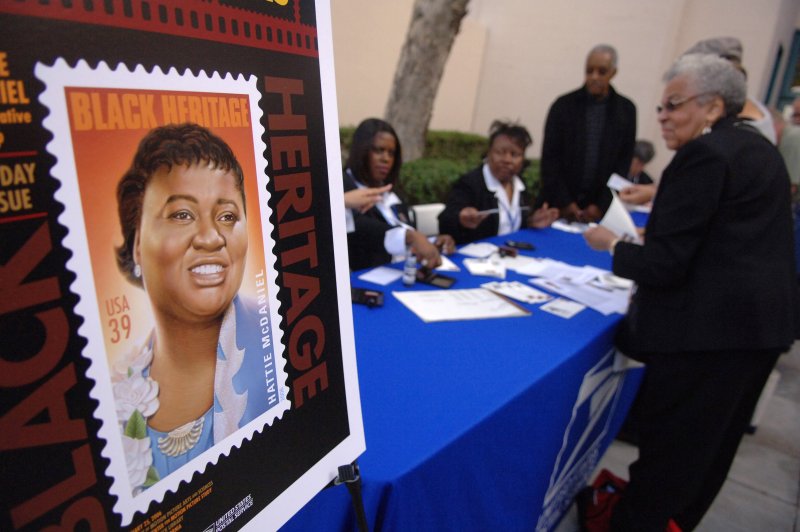1 of 3 | Stamps and memorabilia are for sale at the dedication of a new 39-cent commemorative stamp honoring actress Hattie McDaniel held at the The Academy of Motion Picture Arts and Sciences Fairbanks Center for Motion Picture Study in Beverly Hills, Calif., on January 25, 2006. On February 29, 1940, McDaniel became the first African-American actor to win an Academy Award -- for her role in Gone With the Wind. The movie won eight awards that night. File Photo by Phil McCarten/UPI |
License Photo
Feb. 28 (UPI) -- On this date in history:
In 1704, in the bloodiest event of the so-called Queen Anne's War, Deerfield, a frontier settlement in western Massachusetts, was attacked by a French and indian force. Some 100 men, women and children were massacred as the town was burned to the ground.
In 1868, British statesman Benjamin Disraeli became prime minister for the first time.
In 1916, during World War I, German U-boat commanders were ordered to attack merchant shipping in the Atlantic without warning, a policy that killed thousands and helped draw the United States into the war.
In 1940, Hattie McDaniel became the first African-American actor to win an Academy Award -- for her role in Gone With the Wind. The movie won eight awards that night.
In 1956, almost nine years after becoming an independent nation, Pakistan declared itself an Islamic republic.
In 1968, the President's National Advisory Commission on Civil Disorders condemned racism as the primary cause of the recent surge of riots. The commission said in its Feb. 29, 1968, report that "our nation is moving toward two societies, one black, one white -- separate and unequal."
In 1968, British astronomer Jocelyn Burnell announced the discovery of a pulsating radio source, or "pulsar," in the depths of outer space. She first dubbed it "LGM," short for "little green men." Astrophysicists say pulsars to be rapidly rotating neutron stars.
In 1988, police arrested Nobel Peace Prize winner Archbishop Desmond Tutu as he and others marched on Parliament to protest the government's ban on anti-apartheid activities.
In 2004, Haitian President Jean-Bertrand Aristide resigned and fled the country as rebel forces massed on the outskirts of the capital. U.S. President George Bush ordered Marines into Haiti after the ouster.
File Photo by Ezio Petersen/UPI
In 2004, Peter Jackson's Lord of the Rings: Return of the King, the finale of the epic fantasy trilogy, won all 11 Academy Awards for which it was nominated, including best picture and director, a record sweep.
In 2012, the Syrian Army drove insurgents from the Free Syrian Army out of the Bab Amr neighborhood in the city of Homs. Thousands of innocent civilians have died in the past 11 months in the government's crackdown on opposition activists, the United Nations said.
In 2016, Sen. Jeff Sessions, R-Ala., became the first sitting senator to endorse Donald Trump as president. Trump rewarded Sessions with the Cabinet position of attorney general after he was elected.
File Photo by Pete Marovich/UPI

















